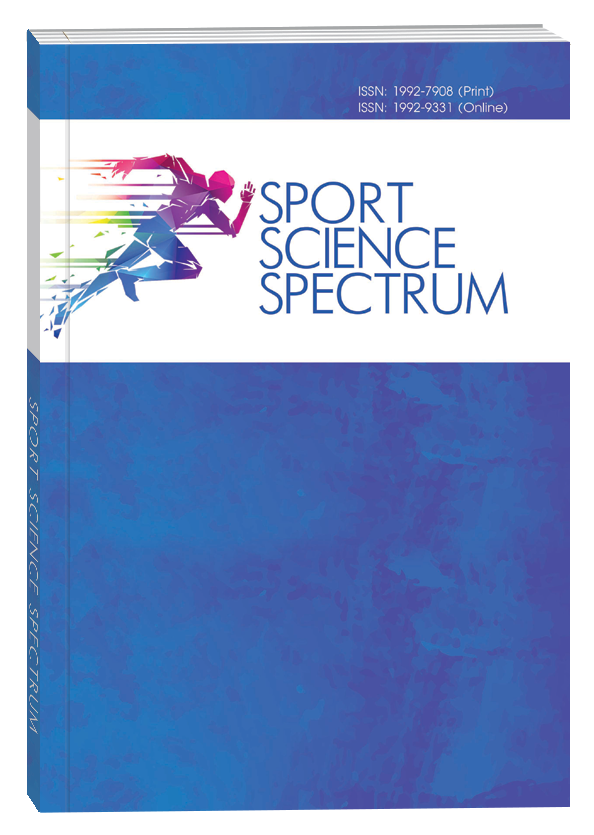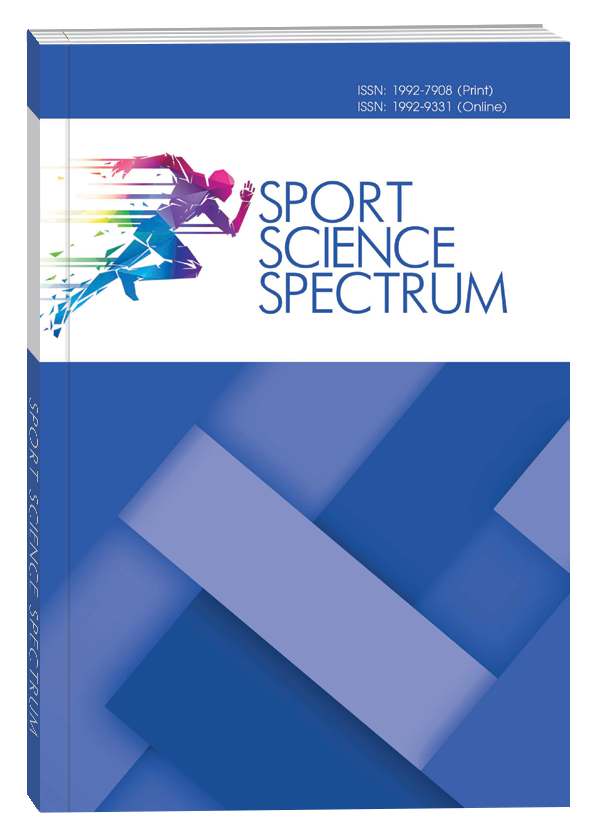THE BEHAVIOR CHANGE WHEEL AS A TOOL FOR IMPROVING COACHES’ WORK BASED ON INCLUSIVITY PRINCIPLES
DOI:
https://doi.org/10.32782/spectrum/2024-3-11Keywords:
inclusion, sports, Behavior Change Wheel, coach, athletes with special educational needsAbstract
The lack of readiness among Ukrainian coaches to work with athletes with special educational needs (SEN), as identified in previous studies, highlights significant barriers related to insufficient professional training and limited access to resources and support. This situation may adversely affect the quality of the training process and the performance outcomes of athletes with SEN, necessitating appropriate interventions. The “Behavior Change Wheel”, utilizing the COM-B model, offers a systematic approach to transforming coaches’ knowledge, skills, and beliefs into positive behaviors. Objective: to identify ways to influence the capability, opportunity, and motivation of coaches to train athletes with special educational needs (SEN) using the “Behavior Change Wheel”. Materials and Methods: analysis, synthesis, generalization, induction and deduction, methods of logical and systemic analysis; the “Behavior Change Wheel” based on the COM-B model, incorporating prior survey results. Results: It was determined that potentially effective measures to enhance capabilities should focus on education, training, coaching, and facilitation. Measures aimed at improving opportunities include restructuring the environment, modeling, enabling, and restricting. One of the promising approaches to improving coaches’ work based on inclusivity within the “Opportunity” domain is the development and provision of modern methodological resources. These resources should incorporate advanced practices in sports aimed at supporting athletes with special educational needs (SEN) in achieving their athletic goals. They should also include recommendations and guidelines for implementing inclusivity in the training process, along with specialized training for coaches on working with athletes with SEN. Interventions to increase coaches’ motivation to train athletes with SEN include coercion, incentivization, and persuasion. Conclusions: the research results may serve as a foundation for developing long-term strategies to promote inclusivity in sports.
References
1. Дослідження якості інклюзивного навчання для дітей з особливими освітніми потребами. Держ. служба якості освіти України, 2021. 79 с. URL: https://mon.gov.ua/storage/app/media/inkluzyvne-navchannya/2021/04/02/Doslidzhennya_yakosti_inklyuzyvnoyi_osvity_1_02_04.pdf
2. Рівень залученості дітей та молоді до рухової і фізичної активності та вплив спорту на фізичне і ментальне здоров’я: звіт за результатами дослідження. Київ, 2023. 62 с. URL: https://dismp.gov.ua/wp-content/uploads/Zvit_ruhova-aktivnist.pdf
3. Шевчук О., Когут І., Маринич В. Компендіум належних прикладів організаційно-методичного забезпечення інклюзивності в спорті: досвід Австралії. Теорія і методика фізичного виховання і спорту. 2023. № 4. С. 84–96. URL: https://doi.org/10.32652/tmfvs.2023.4.84-96
4. Шевчук О., Когут І., Маринич В. Організаційні засади реалізації інклюзивності у спорті. Теорія і методика фізичного виховання і спорту. 2023. № 3. С. 86–95. URL: https://doi.org/10.32652/tmfvs.2023.3.86-95
5. Шевчук О., Когут І., Маринич В. SWOT-аналіз імплементації інклюзивності в роботу тренерів. Фізичне виховання, спорт і культура здоров’я у сучасному суспільстві. 2024. № 3(67). С. 67–74. URL: https://doi.org/10.29038/2220-7481-2024-03-67-74 (дата звернення: 24.11.2024).
6. Addressing barriers to implementing inclusive education in the Pacific / U. Sharma et al. International Journal of Inclusive Education. 2018. Vol. 23, no. 1. P. 65–78. URL: https://doi.org/10.1080/13603116.2018.1514751 (дата звернення: 20.12.2024).
7. Barriers and facilitators to older adult participation in intergenerational physical activity program: a systematic review / F. Zhou et al. Aging Clinical and Experimental Research. 2024. Vol. 36, no. 1. URL: https://doi.org/10.1007/s40520-023-02652-z (дата звернення: 20.12.2024).
8. Canadian Disability Participation Project & Ontario Parasport Collective. An investigation of coaches’ and classifiers’ perceptions of working with athletes with a disability. Kingston : Queen’s University, 2018. 70 p. URL: https://cdpp.ca/sites/default/files/REPORT%20An%20Investigation%20of%20Coaches’%20And%20Classifiers’%20Perceptions%20of%20Working%20with%20Athletes%20with%20a%20Disability_FINAL.pdf
9. Canadian Disability Participation Project & Ontario Parasport Collective. An investigation of coaches’ and classifiers’ perceptions of working with athletes with a disability. Kingston : Queen’s University, 2023. 85 p. URL: https://parasportontario.ca/images/opc/opc-resources/coaching-perspectives-2023.pdf
10. Chen M., Li Q., Wang L. Understanding factors influencing people with disabilities’ participation in sports and cultural activities. BMC Public Health. 2024. Vol. 24, no. 1. URL: https://doi.org/10.1186/s12889-024-17791-9 (дата звернення: 22.08.2024).
11. Chiner E., Cardona M. C. Inclusive education in Spain: how do skills, resources, and supports affect regular education teachers’ perceptions of inclusion? International Journal of Inclusive Education. 2013. Vol. 17, no. 5. P. 526–541. URL: https://doi.org/10.1080/13603116.2012.689864 (дата звернення: 20.12.2024).
12. Chow W. S. E., de Bruin K., Sharma U. A scoping review of perceived support needs of teachers for implementing inclusive education. International Journal of Inclusive Education. 2023. P. 1–20. URL: https://doi.org/10.1080/13603116.2023.2244956 (дата звернення: 20.12.2024).
13. Chow W. S. E. Examining factors influencing teachers’ intentions in implementing inclusive practices in Hong Kong classrooms. Journal of Research in Special Educational Needs. 2023. URL: https://doi.org/10.1111/1471-3802.12632 (дата звернення: 20.12.2024).
14. Co-designing an intervention using the COM-B model to change an eating behaviour in people living with achalasia / M. Kalantari et al. Frontiers in Medicine. 2024. Vol. 11. URL: https://doi.org/10.3389/fmed.2024.1216209 (дата звернення: 20.12.2024).
15. European Commission: Directorate-General for Education. Towards more gender equality in sport – Recommendations and action plan from the High Level Group on Gender Equality in sport. Publications Office of the European Union, 2022. 41 p. URL: https://data.europa.eu/doi/10.2766/10036
16. Hammond A. M. The relationship between disability and inclusion policy and sports coaches’ perceptions of practice. International Journal of Sport Policy and Politics. 2022. P. 1–17. URL: https://doi.org/10.1080/19406940.2022.2074515 (дата звернення: 20.12.2024).
17. Michie P. S., Atkins D. L., West P. R. The Behaviour Change Wheel: A Guide To Designing Interventions. Silverback Publishing, 2014. 332 p.
18. Michie S., van Stralen M. M., West R. The behaviour change wheel: A new method for characterising and designing behaviour change interventions. Implementation Science. 2011. Vol. 6, no. 1. URL: https://doi.org/10.1186/1748-5908-6-42 (дата звернення: 20.12.2024).
19. UNHCR’s Division of External Relations. More than a Game: The UNHCR Sport Strategy 2022 – 2026. UNHCR, 2022. 56 p. URL: https://www.unhcr.org/media/unhcr-sport-strategy-more-game





